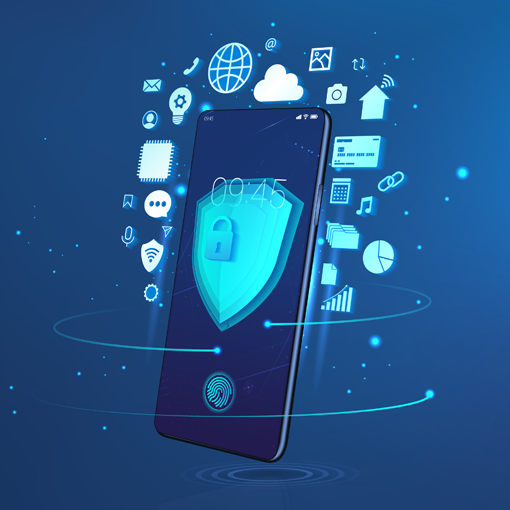Mobile Phone Privacy: What You Need to Know?

The significance of mobile phone privacy cannot be stressed in today’s digital age, where our lives are tightly entwined with mobile devices. Because they now serve as an extension of who we are and store a wealth of private and sensitive data, smartphones have become an indispensable part of our lives. We must be mindful of the expanding privacy hazards and problems related to mobile phones that are being brought on by the quick improvements in technology.
When we talk about mobile phone privacy, we are talking about how our personal data is safeguarded and how we have control over how different organizations gather, access, and utilize it. Our cell phones have evolved into data collection hubs, frequently without our knowledge, with social networking apps and online purchasing platforms. Every phone conversation, text message, and internet visit we make leaves a digital trail that may be followed and examined. While convenience and creativity are brought about by this interconnection, it also makes us vulnerable to threats and dangers.
Compromised mobile phone privacy carries a number of dangers. Our personal information can be misused and exposed, which can result in identity theft, financial fraud, and privacy violations. We must always advance in protecting our privacy since cybercriminals are constantly coming up with new ways to exploit flaws in mobile devices.
It is essential to keep up with developments in mobile phone privacy in order to safeguard our personal information and retain control over our digital life. We can take proactive precautions to protect our personal information by being aware of the risks involved, understanding the privacy settings, and using the security measures that are available to us. The purpose of this blog is to give you the knowledge and insights you need to successfully manage the difficulties of mobile phone privacy.
We will examine the numerous threats to mobile phone privacy in the parts that follow, including unlawful access and the privacy effects of third-party apps and services. We will also go into detail on the steps you can take to safeguard your mobile phone’s privacy, like putting strong device security measures in place, modifying privacy settings, and establishing safe online habits. You will have a thorough understanding of mobile phone privacy at the end of this blog, along with the resources required to protect your personal information.
To keep your digital life secure, stay aware, be proactive, and take control of your mobile phone privacy. Let us explore the realm of mobile phone privacy and learn what you should know to stay safe in this constantly changing digital environment.
Understanding Mobile Phone Privacy
A. Meaning and Relevance
Personal information protection and individual control over data collection, access, and usage on mobile devices are referred to as “mobile phone privacy.” It includes protecting private data including call records, text messages, internet history, location data, and app usage habits. Individuals’ right to control who can access their data and how it is used is guaranteed under mobile phone privacy.
One cannot overstate how crucial mobile phone privacy is, especially in the society we live in today, which is becoming more and more connected. Smartphones carry a tremendous amount of private and sensitive information as they become an essential part of our daily lives. Our mobile devices are storage devices for our digital identities, storing everything from private chats to financial transactions and private images.
Due to a number of factors, maintaining privacy in this digital age is essential. First and foremost, privacy gives people control over their personal data. It gives users the power to control how different entities can use, distribute, and profit from their data. Without privacy, people’s autonomy may be eroded since their personal information may be utilized unfairly or for other purposes without their knowledge or agreement.
Second, mobile phone privacy protects users from fraud, identity theft, and other types of harmful behavior. Cybercriminals are always looking for new ways to obtain private information without authorization and use it for evil. Sensitive information may be exposed via a mobile phone privacy breach, which could result in monetary loss, reputational harm, or even emotional pain.
Additionally, a breach in mobile privacy might make users lose faith in online services and platforms. If people are unsure of the security and privacy protections in place, they may be reluctant to provide personal information or participate in online activities. The development of the digital economy and the scope of technology’s potential advantages may both be hampered by this lack of confidence.
Privacy breaches on mobile devices could have serious repercussions. People may experience identity theft when their personal information is misused, in which case their identities are utilized to carry out fraudulent acts. Additionally, unlawful access to private information can result in financial fraud, in which thieves use financial data for their own financial advantage.
Personal information may also be disclosed to the public or sold on the dark web as a result of violated mobile phone privacy. Wide-ranging effects of such violations might include injury to one’s reputation, invasion of privacy, and potential impairment to interpersonal and professional relationships.
B. Data Gathering and Monitoring
Our lives have become completely dependent on our mobile phones, which help us with a variety of chores and give us fast access to information. However, mobile phones also gather and track a significant amount of data in the process of providing these conveniences. It is critical to comprehend the methods used, the data kinds gathered, and any hazards or repercussions that could result from collecting too much data.
How is data collected and tracked by mobile devices?
Through a combination of internal functions, third-party applications, and connection technologies, mobile phones gather and track data. Here are a few typical techniques for gathering and monitoring data:
- Mobile phones have a variety of sensors built into them, including a GPS, an accelerometer, a gyroscope, and a microphone. These sensors record data on the location, motion, orientation, and sound of the object. Other sensors offer information about user actions and behavior while GPS enables accurate location tracking of the device.
- Mobile operating systems, like iOS and Android, and the apps downloaded on the devices gather information to improve user experience and offer individualized services. They might compile data on system logs, issue reports, device settings, and app usage. This information aids in enhancing performance, perfecting user interfaces, and fixing technical problems.
- Mobile web browsers save cache, cookies, and browsing history information. This makes it possible to customize online content and speed up the loading of previously visited pages. Websites may track user activity, hobbies, and preferences thanks to it, though.
- Mobile phones provide network-related data when they are connected to wireless networks, such as the network provider, signal strength, and the Wi-Fi networks accessed. The travels of users can be tracked using this data, and location profiles can be created.
Data types gathered
Mobile devices gather a variety of data, giving consumers insights into different facets of their lives. Here are some typical data kinds that are gathered:
- Location Information: GPS, Wi-Fi signals, and cell towers are all used by mobile phones to continuously gather and store location data. Location-based services, such maps, navigation, and local recommendations, are made possible by this data.
- Personal Identifiable Information (PII): Name, address, phone number, email address, and social media profiles are examples of Personal Identifiable Information (PII). For the purpose of user identification and authentication, mobile apps and services may gather and retain this information.
- Browsing History: Website visits, search terms, and interactions with web content are all tracked by mobile browsers. This information aids in providing tailored advertisements and enhancing search results.
- App Usage Data: Data about how users engage with mobile apps, such as features used, time spent, and preferences, is collected by the apps themselves. App developers may improve user experiences and optimize their products with the help of this information.
Consequences and risks of collecting too much data
Concerns regarding privacy, security, and the misuse of personal information are raised by excessive data collection. Here are some dangers and effects related to it:
- The risk of data violations rises with the storage of huge amounts of personal information. Inappropriate use of this data can result in identity theft, financial fraud, and unauthorized access to sensitive data.
- Through extensive data collecting, advertisers may develop in-depth user profiles and present tailored adverts. This can improve the relevancy of adverts, but it also raises questions about privacy invasion and user behavior manipulation.
- Based on a person’s actions, interests, and habits, an organization can develop a thorough profile of them through data gathering and tracking. These profiles can be used for targeted advertising, but they also create issues with privacy and the possibility of discrimination based on data collection.
- Organizations frequently sell or share user data with third parties in order to monetize the data they have collected. Users may thereby lose control over the use of their personal data for purposes they may not be aware of or consent to.
- Excessive data collecting could make it possible for authorities to track citizens’ movements, thus violating their civil and private rights.
It is critical for users to be aware of the data their mobile devices are collecting, to comprehend the privacy policies of the apps and services they use, and to make informed decisions about data sharing and permissions. People can protect their privacy by being aware of these threats and taking precautions including carefully reading app permissions, choosing privacy-focused apps and services, and routinely deleting superfluous data from their devices.
Mobile Phone Privacy Risks
Unauthorized Access
Mobile devices are prime candidates for unwanted access due to the abundance of personal data they hold. Identity theft, financial fraud, and privacy violations are just a few of the serious consequences that can result when people’s personal information is misused. It is essential to comprehend the dangers of unauthorized access before taking preventative steps to safeguard mobile phone privacy.
- Identity Theft: Identity theft occurs when nefarious individuals steal someone’s identity and use it for fraudulent means as a result of unauthorized access to personal information. This can involve opening accounts, making purchases, or engaging in other types of fraud using stolen personal information, including social security numbers, addresses, and financial details. Financial loss, ruined credit, and severe mental pain for the victims of identity theft are all possible outcomes.
Example: A mobile phone user’s personal information, such as their social security number and financial information, is stolen by a cybercriminal who gains access to the device. Using this information, the thief opens credit card accounts, makes loan applications, and conducts unlawful transactions, leaving the victim with debts and a poor credit history.
- Financial Fraud: Due to the possibility of these devices storing sensitive banking and payment information, unauthorized access to mobile devices might facilitate financial fraud. These details can be used by cybercriminals to carry out illicit transactions, transfer money, or create false purchases. Financial fraud can result in anything from monetary losses to low credit scores.
Example: A hacker gains access to a person’s banking app after compromising the person’s mobile device. The hacker then starts illegal transactions, transferring money to their own accounts or engaging in illegal transactions by exploiting the victim’s payment information.
- Privacy Breaches: Privacy violations may come from unauthorized access to personal information on mobile devices. When private conversations, pictures, or documents are accessed without the user’s permission, this can happen. A breach of privacy may result in humiliation, harm to one’s reputation, and strained interpersonal ties.
Example: A hacker gains access to a user’s private images and conversations after hacking a mobile device. The hacker causes the victim great anguish and harm to their privacy by sharing the private information with the public or utilizing it as a form of blackmail.
Statistics to demonstrate how serious these risks are:
- The Identity Theft Resource Center estimates that over 1.4 million cases of identity theft were recorded in the United States alone in 2020, with incidences involving mobile phones on the rise.
- Consumers lost more than $3.3 billion to fraud in 2020, according to the Federal Trade Commission (FTC), with mobile phone-related fraud playing a substantial role.
- One in three consumers reported suffering financial loss as a result of unauthorized access to their mobile devices, according to a NortonLifeLock poll.
These figures demonstrate the alarmingly high prevalence of illicit access and its possible repercussions. It highlights the significance of putting strong security measures in place to safeguard mobile phone privacy, such as strong passcodes, biometric verification, and frequent software updates.
B. Apps and services from third parties
Mobile phone users frequently use third-party apps and services, which offer a wide range of features and services. Nevertheless, it is crucial to be aware of how these apps affect privacy. The giving of too many permits poses a serious risk. Users frequently ask for access to the contacts, location, camera, and microphone when downloading and installing programs on their devices. While some permissions could be required for the functionality of the app, others might seem superfluous or unrelated. Giving an app too many rights could put your privacy at risk since it will be able to access and collect more of your personal information than is necessary. This information may be sold to outside parties, used for targeted advertising, or even made public in the event of a data breach. To properly secure their privacy, users must use caution and carefully assess the rights they allow to third-party apps.
It is essential to assess and secure third-party apps in order to protect privacy when using them. Here are some ideas to keep in mind:
- Read and comprehend privacy policies: Spend some time reading an app’s privacy policy before downloading it. Be mindful of how the app gathers, utilizes, and shares your data. Make sure the app is transparent about how it manages your personal data and whether it distributes information with outside parties.
- Check App Permissions: App permissions should be checked: Before installing an app, look over the permissions it demands. Apps that ask for too many permissions unrelated to their primary operation should be avoided. Give the program only the permissions essential for it to function properly.
- Pick Reputable Apps: Refrain from downloading apps from places that are not reputable, like legitimate app stores. Security safeguards are in place on these platforms to lessen the possibility of harmful programs. Before downloading, consider the app’s reputation by reading customer reviews and ratings.
- Keep Apps Updated: Developers frequently publish updates that fix security flaws and improve privacy protections. To take advantage of the most recent privacy improvements and security patches, make sure your apps are up to date.
- Use Privacy-Focused Apps: Take into account choosing apps that put user privacy first. Look for apps with encryption, privacy settings, and strong data protection features already built in.
- Review the app’s settings: Within the app, look into the privacy options and change them to suit your tastes. Disable unused features that could gather and share personal information.
Users may make informed decisions and take the appropriate precautions to protect their privacy while using third-party apps by heeding the advice in this guide. To maintain the security of our personal data, it is crucial to remain cautious and knowledgeable about the privacy policies of the apps we use.
Protecting Mobile Phone Privacy
A. Security measures for devices
Protecting mobile phone privacy is crucial in the current digital era. Protecting personal data from unwanted access and potential privacy violations requires the implementation of robust device security mechanisms. Users can dramatically increase the security of their mobile devices by using passcodes, biometric authentication, and encryption.
- Passcodes: The first line of defense against unwanted access to mobile phones is creating a strong passcode. An additional degree of security is provided by a sophisticated passcode that combines numbers, characters, and symbols. It is imperative to refrain from employing passcodes that are simple to decipher, including birth dates or sequence digits. The passcode should be updated frequently to further increase security.
- Biometric verification: Mobile devices can be accessed securely and conveniently using biometric authentication techniques like fingerprint or face recognition. These techniques offer difficult-to-replicate unique IDs, making it harder for unauthorized parties to acquire access. When biometric authentication is enabled, the device can only be unlocked by the authorized user.
- Encryption: A crucial security technique for the protection of data stored on mobile devices is encryption. Data is scrambled, rendering it unintelligible without the encryption key. Data that is encrypted is safe and inaccessible to potential attackers even in the event of theft or unlawful access. To protect their personal information, users should enable device encryption.
Observe these guidelines to protect mobile devices from illegal access:
- To make sure the most recent security updates are installed, update the operating system and apps on the device frequently.
- For the purpose of locating and erasing data from a lost or stolen device, enable remote tracking and wiping features.
- Be wary about public Wi-Fi networks and refrain from using unsecured networks to access important data.
- Install trustworthy mobile security applications with extra levels of defense including anti-malware and anti-theft features.
- For additional security, enable two-factor authentication (2FA) for critical accounts.
- Avoid rooting or jailbreaking your device because doing so undermines its security and could leave it vulnerable.
Users can considerably lower the danger of unwanted access to their mobile phones and safeguard their personal data by putting these device security measures in place. To protect privacy in a connected society, mobile phone security must be given top priority.
B. Safe Online Practices:
Protecting personal data from risks requires maintaining mobile phone privacy while accessing the internet. Users can effectively protect their privacy by adopting safe online behaviors and adhering to best practices.
- Use secure Wi-Fi networks whenever you connect to the internet. Although they may be practical, public Wi-Fi networks, such those found in coffee shops or airports, frequently lack adequate security protections. These networks put your mobile device at danger for a number of things, like data interception and unlawful access. To ensure a secure browsing experience, join trusted, password-protected networks whenever possible.
- Mobile phone privacy might be jeopardized by clicking on dubious websites or falling for phishing scams. Use caution when responding to emails, texts, or social media postings that contain erroneous or dubious links. These links can take you to nefarious websites meant to steal your personal data. Be cautious and only click on links from reliable sources. When asked for sensitive information or login credentials, exercise extra caution.
- When browsing the internet, virtual private networks (VPNs) give an extra layer of protection and anonymity. Internet traffic is encrypted with VPNs, making it more difficult for third parties to eavesdrop on or see your online activities. When utilizing public Wi-Fi networks or gaining access to sensitive information, it is extremely important to protect your mobile phone’s data and keep your anonymity by connecting to a VPN.
- To ensure security and preserve privacy, mobile operating systems and apps must be updated often. Updates are released by developers to fix security flaws and vulnerabilities. By skipping these updates, you expose your device to fraudsters’ exploitation. When possible, enable automatic updates; alternatively, frequently check manually for updates.
- Check the permissions that new apps ask for carefully before downloading them. Examine whether the requested permissions are compatible with the features of the app. Excessive permissions can unnecessarily reveal personal information. Ensure that just the permissions necessary for the app to operate properly are granted.
- Installing trustworthy mobile security apps that offer supplementary defense against malware, phishing attempts, and other potential risks is a good idea. These apps frequently provide functions like app scanning, secure browsing, and anti-theft protection to improve the privacy and security of mobile devices.
Users can protect their mobile phone privacy and lower the danger of data breaches and unauthorized access by implementing these safe online practices. In a digital environment that is becoming more interconnected, it is critical to maintain awareness, use caution, and protect privacy.
Conclusion
Mobile phone privacy has become essential in the current digital world. Identity theft, financial fraud, and privacy breaches are just a few of the serious repercussions that violated privacy can cause. It is essential that people are aware of the hazards and take preventative measures to safeguard their mobile phone privacy.
Users can protect their personal data and retain control over their privacy by being aware of the ramifications of data gathering and illegal access, being cautious of third-party apps and services, and putting strong device security measures in place. Further enhancing mobile phone privacy are safe internet practices including using secure Wi-Fi networks, avoiding dubious connections, and thinking about using virtual private networks (VPNs).
Keep in mind that maintaining privacy on mobile devices requires constant effort. Keep up with the most recent privacy trends, update your programs and operating system, and periodically examine and tweak your privacy settings. You can take control of your mobile phone privacy and benefit from the digital world without risking the privacy of your personal data by being proactive and watchful.
Take control of your mobile privacy today to keep your personal information safe in this world of constant connectivity.







